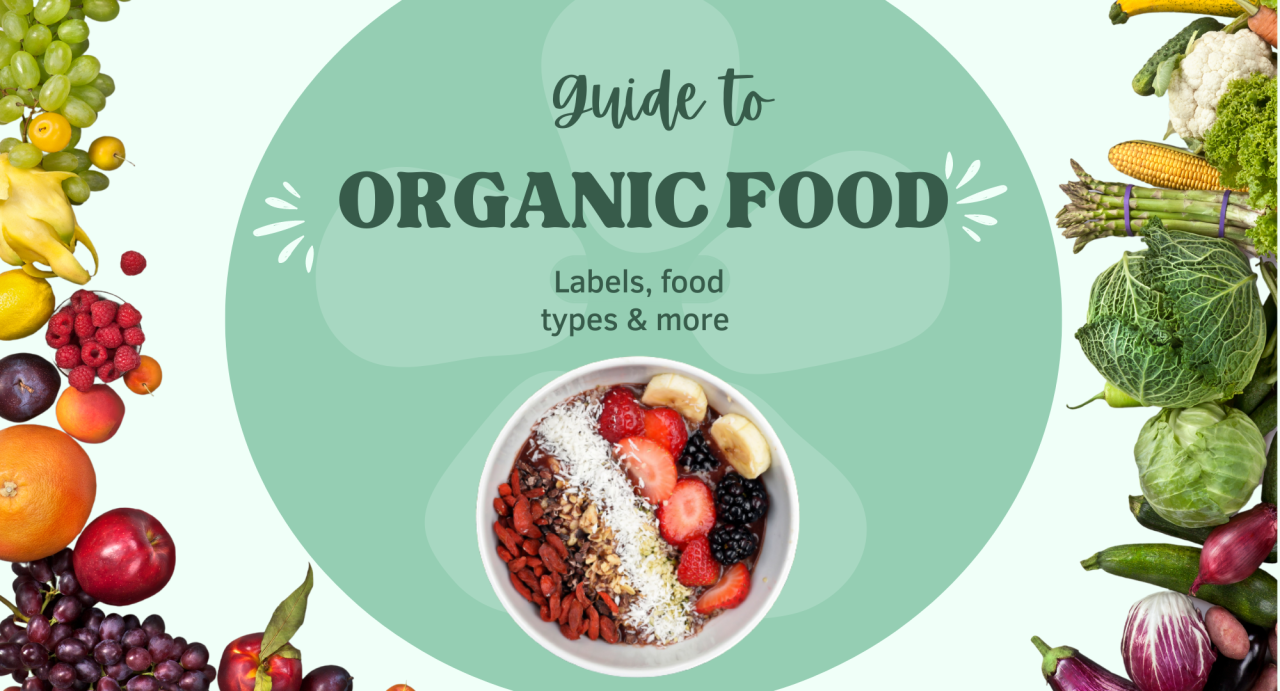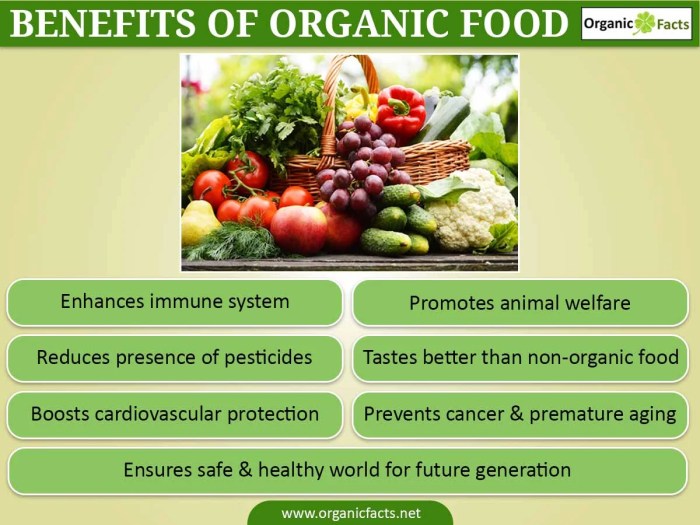Organic food benefits are more than just a trend – they’re a lifestyle choice that impacts health, the environment, and certification standards. Get ready to dive into the world of organic goodness with a fresh perspective that’s as cool as your favorite high school hangout spot.
When it comes to organic food, the benefits extend far beyond what meets the eye. From better health outcomes to sustainable farming practices, there’s a lot to unpack in this nutritious journey.
Benefits of Organic Food
Organic food refers to produce that has been grown and processed without the use of synthetic pesticides, fertilizers, or genetically modified organisms. This type of food is typically grown using natural methods that promote soil and water conservation and reduce pollution.
Advantages of Consuming Organic Food
- Higher nutrient content: Organic fruits and vegetables are shown to have higher levels of certain vitamins, minerals, and antioxidants compared to conventionally grown produce.
- Reduced exposure to pesticides: Organic farming practices eliminate the use of synthetic pesticides, reducing the risk of chemical residue in food and potential health effects.
- Supports sustainable agriculture: Organic farming promotes biodiversity, soil health, and conservation of natural resources, contributing to long-term environmental sustainability.
- Better for the environment: Organic farming practices help reduce pollution, conserve water, and promote healthier ecosystems, ultimately benefiting wildlife and future generations.
Nutritional Value of Organic Food vs. Conventionally Grown Food
Studies have shown that organic food may contain higher levels of certain nutrients, such as antioxidants, which are important for overall health and disease prevention.
Organic meat and dairy products have been found to have higher levels of omega-3 fatty acids, which are beneficial for heart health.
On the other hand, conventionally grown produce may contain more pesticide residues, which have been linked to negative health effects, such as hormone disruption and increased risk of certain diseases.
Health Benefits: Organic Food Benefits

Eating organic food can have numerous health benefits that contribute to overall well-being. Organic food is grown without the use of synthetic pesticides, herbicides, or genetically modified organisms, making it a healthier option for consumers.
Nutrient Density
Organic fruits and vegetables are often more nutrient-dense compared to conventionally grown produce. This is because organic farming practices focus on improving soil health, which leads to plants absorbing more nutrients from the soil. As a result, organic food can provide higher levels of vitamins, minerals, and antioxidants essential for maintaining good health.
Reduced Exposure to Harmful Chemicals
One key health benefit of consuming organic food is the reduced exposure to harmful chemicals commonly found in conventionally grown crops. By avoiding pesticides and herbicides used in conventional farming, individuals can lower their risk of health issues linked to these chemicals, such as cancer, hormone disruption, and neurological disorders.
Improved Digestive Health
Organic food is often free from artificial additives, preservatives, and hormones that can negatively impact digestive health. By choosing organic options, individuals can support a healthier gut microbiome and reduce the risk of digestive issues like bloating, gas, and inflammation. This can lead to better overall digestive health and improved nutrient absorption.
Environmental Impact
In addition to personal health benefits, consuming organic food also has positive effects on the environment. Organic farming practices prioritize soil health, biodiversity, and sustainable agricultural methods, which can help reduce pollution, conserve water resources, and support wildlife habitats. By supporting organic farming, individuals can contribute to a healthier planet and better long-term health outcomes for future generations.
Environmental Impact
Organic farming practices play a crucial role in benefiting the environment by promoting sustainability and reducing the negative impact on ecosystems. By avoiding the use of synthetic pesticides and fertilizers, organic agriculture helps in preserving soil quality, reducing water pollution, and conserving energy.
Promotion of Biodiversity
Organic agriculture promotes biodiversity by maintaining a more diverse range of plant and animal species. Unlike conventional farming, which often relies on monoculture crops that strip the land of its natural diversity, organic farms cultivate a variety of crops and create habitats for beneficial insects and wildlife.
- Organic farms provide a habitat for pollinators such as bees, butterflies, and birds, which are essential for the reproduction of many plants.
- By avoiding the use of synthetic chemicals, organic farming protects the soil microbiome, which is crucial for nutrient cycling and maintaining soil health.
- Organic agriculture encourages crop rotation and intercropping, which help in pest control and disease prevention without the need for chemical inputs.
Importance of Sustainable Farming
Sustainable farming methods are essential for long-term environmental health as they ensure that resources are preserved for future generations. Organic farming practices focus on replenishing soil fertility, conserving water, and reducing the carbon footprint of agriculture.
- Organic farming helps in reducing greenhouse gas emissions by avoiding the use of synthetic nitrogen fertilizers, which contribute to climate change.
- By promoting soil health and biodiversity, organic agriculture enhances the resilience of ecosystems to climate change impacts such as extreme weather events and pests.
- Sustainable farming methods also prioritize water conservation, reducing the pollution of water bodies and ensuring the availability of clean water for communities.
Organic Certification

Organic certification is a process through which food products are verified to be grown and produced according to organic farming standards. This ensures that the products are free from synthetic pesticides, fertilizers, and genetically modified organisms (GMOs).
Significance of Organic Labels
Organic labels are crucial for consumers as they provide assurance that the product they are purchasing meets specific organic standards. This helps consumers make informed decisions about the food they are buying, knowing that it is free from harmful chemicals and additives.
- Organic labels indicate that the food has been produced without the use of synthetic pesticides or fertilizers, promoting better health outcomes for consumers.
- Consumers can trust organic labels to ensure that the food they are purchasing is environmentally friendly and sustainable.
- Organic labels can also help support small-scale organic farmers who follow sustainable farming practices.
Different Organic Certification Standards, Organic food benefits
There are various organic certification standards around the world, each with its own set of requirements and criteria. Some of the most recognized organic certification standards include:
- USDA Organic: The United States Department of Agriculture (USDA) has strict guidelines for organic certification, ensuring that products are grown and processed without synthetic pesticides or GMOs.
- EU Organic: The European Union has its own organic certification standards, which are similar to the USDA Organic standards but may have some variations in terms of allowed practices.
- Japan Organic: Japan also has its organic certification program, focusing on sustainable farming practices and ensuring the quality of organic products in the market.